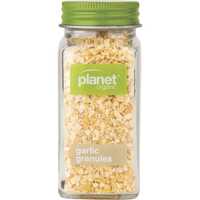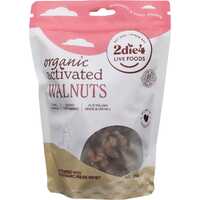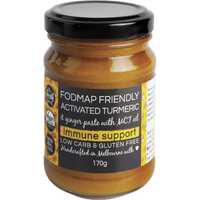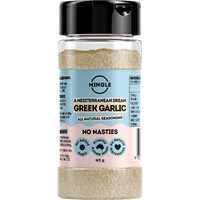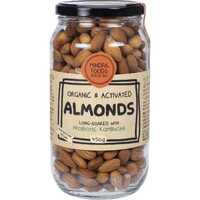Healthy natural foods can be found all over the world. From north to south and east to west, every culture on Earth has developed its own unique diet. Some regions have become famous for healthy eating, however, including the nations of the Mediterranean. In this chapter of our global health food tour, we'll visit the magnificent coastlines of Southern Europe, Northern Africa, and the Middle East.
Known for its rich ancient cultures and healthy modern lifestyles, this part of the world is associated with some of the best food on the planet.
Let's dive deep into Mediterranean cuisine and review the best natural foods from this special region. From local produce to superfood supplements, learning about food is a great way to discover the world.
What is Mediterranean Food?
The Mediterranean is a huge region that encompasses much of Southern Europe, North Africa, and Western Asia. There are 20 nations that border the Mediterranean Sea, two islands enveloped by it, and many neighbouring countries that also embrace the "Mediterranean" name. From Greece and Spain to Libya and Turkey, this diverse part of the world is known for its beautiful landscapes, friendly people, and healthy diet.
Lots of Mediterranean food is native to the area, but some ingredients were introduced from the Arab world in the Middle Ages. Just like every other diet, Mediterranean food is mostly defined by its unique elements. Traditionally, people from this area consumed olive oil instead of butter, fish more than red meat, and wine over beer. Once the Arabs introduced nuts, seeds, and dried fruits, Mediterranean cuisine took on its own rich personality.
Before we can talk about the food from this region, it's important to distinguish the Mediterranean diet from Mediterranean cuisine.
Mediterranean cuisine
Mediterranean cuisine is an all-embracing concept that includes all traditional food from the Mediterranean region. While this term has been criticised for covering such a huge range of foods, there is at least one unifying factor. This entire geographical area follows the distribution of the olive tree, which is fundamental to all local cuisines. Along with olives and the oil they produce, the widespread consumption of wheat and grapes is also shared by most Mediterranean nations. There are also numerous differences between national foods, however, with a Moroccan tagine tasting very different to a Greek salad or a Spanish paella.
Mediterranean diet
The modern Mediterranean diet is not as expansive, however, being mostly inspired by eating habits from southern Spain and Italy. While other geographic regions continue to influence this diet, it has mostly solidified based on scientific studies. Olive oil is central to this diet, with other common ingredients including wholegrain cereals, legumes, fruits, and vegetables. With plenty of these ingredients and moderate amounts of fish, dairy, and meat, the Mediterranean diet has become popular across the world. While it's inspired by traditional consumption habits, this diet is best described as a nutritional concept.
Superfoods from Southern Europe, North Africa & Western Asia
From Turkey to Spain, Mediterranean cultures enjoy a deep and personal relationship with food. Some of the world's most beloved ingredients come from this part of the world, and a number of special flavour combinations have developed over the centuries. While everything starts with the humble olive, Mediterranean cuisine is also defined by nuts and seeds, herbs and spices, fruits and vegetables, and healthy fishy fats. Let's take a look at some of the best food from the Med.
Olive oil
You can't talk about Mediterranean food without mentioning olives. The single unifying force in Mediterranean cuisine, according to some experts, this bitter fruit has a personality and influence much bigger than its form would suggest. The olive tree is native to ancient Persia and Mesopotamia, and it soon spread to the Mediterranean Basin. It also grows in places with a Mediterranean climate, including Australia, New Zealand, South Africa, and the Americas.
The olive tree's fruit, or simply the olive, is used primarily to make olive oil. Roughly 80% of all harvested olives are turned into oil, with the other 20% used as table olives or added to meals. Olive oil is central to Mediterranean food, and it also has a strong influence on Middle Eastern cuisine. There is evidence of olive oil as far back as 6000 BC, with this life-affirming oil loved by the ancient Egyptians, Greeks, and Romans. It even has symbolic importance, with the olive tree traditionally seen as a symbol of peace between nations.
In terms of chemistry, olive oil is composed mostly of fatty acids, including the mixed triglyceride esters of oleic acid, linoleic acid, and palmitic acid. Olive oil also has traces of squalene and sterols, with overall composition varying according to the tree type, region, time of harvest, and extraction process. While they make up just 0.5%, it's the phenolics in olive oil that provide the bitter taste and unique aroma. Olive oil has at least 30 phenolic compounds, including elenolic acid, alpha-tocopherol, flavonoids, lignans, and pinoresinol.
These constituents have lots of vitamin E and vitamin K content, along with a large amount of iron, energy, and fat. For every 100 g of fat in olive oil, 73 g is monounsaturated fat, 14 g is saturated fat, and 11 g is polyunsaturated fat. Of the latter, there is 0.8 g of omega-3 fat and 9.8 g of omega-6 fat. There have been multiple studies into olive oil consumption, and for the most part, the results are promising. The monounsaturated fats in olive oil may help to reduce the risk of coronary heart disease, as long as you only use it to replace a similar amount of saturated fat.
There are three common types of olive oil:
- Standard olive oil. Regular olive oil is a combination of refined olive oil and virgin olive oil at a ratio of roughly 80% to 20%. This olive oil is lighter than extra virgin olive oil, and it also has a more neutral flavour.
- Extra virgin olive oil. Extra virgin olive oil has the most refined flavour and the biggest health benefits. It's made without high heat or chemicals, leading to more bioactive compounds and a delicious yet bold taste.
- Virgin olive oil. Virgin olive oil is quite rare, being extracted naturally and left completely unrefined. This type of olive oil has a fairly mild taste with subtle natural flavours and aromas.
Nuts and seeds
Nuts and seeds have been integral to the Mediterranean diet for a long time. A wide array of nuts and seeds flourish in the dry Mediterranean environment, and they're used in everything from cereals and snacks to main meals and desserts. The following products are among the most popular:
Almonds
Almond trees thrive in the Mediterranean climate, from the plains of Spain to the steep hills of Italy and the coastline of Turkey. Native to the ancient Persian world, these delicious nuts offer a range of health benefits. Almonds are high in antioxidants, full of vitamin E, and jam-packed with fibre and protein. They're also easy to consume, as they can be made into flour, oil, milk, butter, or marzipan.
Walnuts
Walnuts are used across the Mediterranean, from salads and cereals to the delectable Muhammara — a Turkish and Syrian roasted red pepper spread. These versatile and rather "meaty" nuts are a fantastic plant source of omega-3 fatty acids, along with vitamins and minerals such as copper, magnesium, manganese, niacin, and folate.
Sesame seeds
If you're familiar with the Mediterranean staple hummus, then you're probably very familiar with sesame seeds. Hummus is a delicious spread made from a combination of chickpeas and tahini, the latter of which is made from pulverised sesame seeds. These small but mighty seeds also feature in many desserts, including the Greek delicacy pasteli and the Persian treat halva. Sesame seeds are full of beneficial vitamins and minerals.
Pistachios
Last but certainly not least, pistachios can be found across the Mediterranean. These delicious nuts are part of the cashew family, which, surprisingly, also features mangoes, sumac, and poison ivy. Pistachios are common in Moroccan tagines, and they make a colourful addition to pasta, couscous, and numerous other European grain dishes. These nuts provide lots of unsaturated fatty acids, along with high levels of potassium and fibre.
Herbs and spices
Along with healthy ingredients, Mediterranean food is known for its inspiring food combinations. Various herbs and spices are used to enhance food flavours, with common examples including basil, coriander, cumin, fennel, garlic, lavender, mint, oregano, parsley, paprika, rosemary, saffron, sage, sumac, thyme, and turmeric.
There are simply too many herbs and spices to mention in full, but many of them share one important property. Many of the ingredients just listed have amazing anti-microbial properties, which means they can kill dangerous microbes in food. If you enjoy the delicious taste of garlic, thyme, sage, or oregano, you're benefiting from this important protective quality.
Fish and seafood
Healthy omega-3 fats are present in lots of Mediterranean ingredients, including fish and many other seafood products. These heart-friendly fats are plentiful in the Mediterranean Sea, with popular seafood products including salmon, sardines, abalone, clams, crab, herring, anchovies, lobster, mussels, octopus, oysters, and tuna. These foods are a fantastic source of healthy fats, and they also include a rich assortment of vitamins and minerals.
Fresh fruits and vegetables
Traditional Mediterranean cuisine is also full of fresh vegetables and fruits, which offer a vast array of vitamins and minerals. Some of the healthy produce common to this region includes artichokes, beets, broccoli, cabbage, carrots, celery, cucumbers, dandelions, eggplant, fennel, kale, leeks, lemons, mushrooms, nettles, and onions. Dandelions deserve special mention, with these extremely nutritious greens providing a fantastic source of folate, calcium, and potassium, along with vitamins A, C, and K.
If you want to enjoy the benefits of the Mediterranean diet, Healthy Being has got you covered. We keep a wide array of healthy foods and supplements in stock, including olive oils, nuts and seeds, herbs and spices, omega-3 supplements, and dandelion tea. So check out our website today and enjoy free shipping options across Australia and worldwide delivery!


 Certified Organic
Certified Organic Vegan Friendly
Vegan Friendly  Vegetarian
Vegetarian Organic Ingredients
Organic Ingredients Dairy Free
Dairy Free Gluten Free
Gluten Free Keto Friendly
Keto Friendly


























